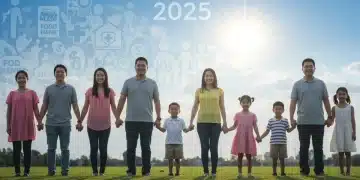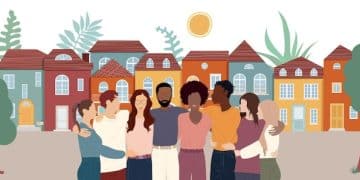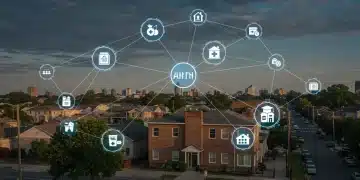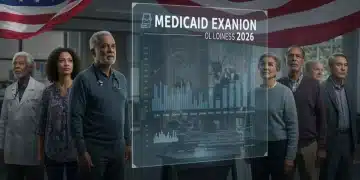Are You Eligible? Discover New 2025 Community Resource Programs

Are you eligible for new community resource programs in 2025? This article highlights key upcoming programs designed to support individuals and families, providing information on eligibility and how to access these valuable resources.
Discover if you’re eligible for the transformative Are You Eligible? New 2025 Community Resource Programs You Need to Know About, designed to empower individuals and families. These programs offer vital support, ensuring a brighter future for all.
Understanding the Landscape of 2025 Community Resources
The landscape of community resources is constantly evolving, with new programs emerging to address pressing needs. In 2025, several initiatives are set to launch, offering vital support to individuals and families across various demographics.
These programs aim to tackle challenges related to housing, food security, healthcare, and education, among others, and it’s crucial to understand what’s available and whether you might be eligible.
Key Areas of Focus for New Programs
Many new 2025 community resource programs focus on improving access to essential services. These services often serve as a foundation for improving other areas of life for program participants.
Program Eligibility Criteria
Understanding the criteria can help you determine which programs are most relevant to your circumstances. Often eligibility is based on income, location, family size, and other factors.
- Income Thresholds: Programs frequently set income limits to ensure resources reach those most in need.
- Geographic Restrictions: Some programs are limited to specific ZIP codes, cities, or counties.
- Family Status: Certain programs cater to single parents, families with young children, or senior citizens.
- Specific Needs: Other programs may target individuals facing particular challenges, such as homelessness or food insecurity.
Staying informed about these evolving criteria is essential for maximizing your access to available support and navigating the eligibility requirements.

Spotlight on Housing Assistance Programs
Housing assistance programs are critical for those struggling to find or maintain stable housing. New initiatives for 2025 aim to expand access to affordable housing, rental assistance, and support services for homeowners.
These programs are designed to alleviate the financial burden of housing and create pathways to long-term stability.
Rental Assistance Programs
Rental assistance programs provide financial support to low-income renters, helping them cover a portion of their monthly rent. These programs can significantly reduce the risk of eviction and homelessness.
Homeownership Support Programs
Besides paying rent costs, there are also homeownership support programs. These programs aim to open the door for owning a home for many low-income individuals.
- Down Payment Assistance: Grants and loans to help first-time homebuyers cover upfront costs.
- Mortgage Rate Reduction: Programs that lower interest rates for eligible borrowers.
- Foreclosure Prevention: Counseling and financial assistance to help homeowners avoid foreclosure.
These programs not only promote individual stability but also contribute to stronger, more resilient communities by fostering homeownership.
Addressing Food Insecurity with New Initiatives
Food insecurity remains a significant challenge for many families in the US. New programs in 2025 are focused on expanding access to nutritious food, reducing food waste, and promoting sustainable food systems.
These initiatives are designed to ensure that everyone has access to the food they need to thrive.
Expansion of SNAP Benefits
The Supplemental Nutrition Assistance Program (SNAP) provides low-income individuals and families with monthly financial assistance to purchase groceries. Some states are actively working to expand eligiblity to SNAP benefits.
Community Gardens and Urban Farming
Efforts to promote local food production are gaining momentum, with the establishment of community gardens and urban farming initiatives in underserved neighborhoods. This promotes community amongst participants.
- Increased Access to Fresh Produce: Community gardens provide access to locally grown fruits and vegetables.
- Educational Opportunities: Workshops and training sessions teach participants about gardening and nutrition.
- Community Building: Gardens serve as gathering places, fostering social connections and a sense of belonging.
Through these initiatives, communities become more resilient, fostering a culture of health and well-being rooted in sustainable food practices.

Healthcare Access and Wellness Programs
Access to quality healthcare is essential for maintaining overall well-being. New programs in 2025 are aimed at improving healthcare access, promoting preventative care, and addressing health disparities.
These initiatives are designed to ensure that everyone has the opportunity to live a healthy and fulfilling life.
Expansion of Medicaid Coverage
Medicaid provides healthcare coverage to low-income individuals and families. Efforts to expand Medicaid eligibility are underway in several states, aiming to reach more people in need of healthcare services.
Mental Health Support Services
Recognizing the importance of mental health, new programs are being launched to provide accessible and affordable mental health support services. Mental health is just as important as physical health!
These programs emphasize early intervention, with a focus on teaching coping skills and promoting resilience from a young age. Counseling services, support groups, and crisis intervention hotlines are becoming more accessible.
Education and Skill Development Opportunities
Education and skill development are key to unlocking economic opportunity and improving quality of life. In 2025, new programs will focus on expanding access to education, vocational training, and workforce development initiatives.
These initiatives are designed to equip individuals with the skills they need to succeed in a rapidly evolving job market.
Scholarships and Grants for Higher Education
Financial barriers often prevent students from pursuing higher education. New scholarship and grant programs are being established to help students cover tuition costs, fees, and other educational expenses.
Vocational Training Programs
Vocational training programs offer hands-on training in specific trades and industries, preparing individuals for in-demand jobs. These programs include:
- Apprenticeship Programs: Earn-while-you-learn opportunities in skilled trades.
- Certificate Programs: Short-term training courses leading to industry-recognized credentials.
- Job Placement Assistance: Career counseling and job search support to help graduates find employment.
By bridging the skills gap and providing accessible training opportunities, these programs empower individuals to secure fulfilling careers and contribute to the economic vitality of their communities.
Navigating the Application Process
Applying for community resource programs can sometimes feel overwhelming, but there are steps you can take to simplify the process and increase your chances of success. Understanding the eligibility criteria, gathering necessary documents, and seeking assistance when needed can make a significant difference.
We will highlight some of the ways you can navigate the application process efficiently for the new 2025 community resource programs.
Gathering Necessary Documents
Before starting an application, collect all required documents, such as proof of income, identification, and residency verification. This will streamline the process and prevent delays later on.
Seeking Assistance from Community Organizations
Local community organizations offer invaluable support to individuals navigating the application process. These organizations can provide guidance, answer questions, and offer assistance with completing application forms. Support is available, be sure to seek it out!
Conclusion
As we look ahead to 2025, these new community resource programs hold great promise for improving the lives of individuals and strengthening communities. By understanding the eligibility criteria, exploring available resources, and navigating the application process effectively, you can access the support you need to thrive. Staying informed and proactively seeking assistance can unlock opportunities and create a brighter future for you and your family.
| Key Point | Brief Description |
|---|---|
| 🏠 Housing Assistance | Programs for rental and homeownership support. |
| 🍎 Food Security | Initiatives expanding access to nutritious food. |
| ⚕️ Healthcare Access | Programs improving healthcare and mental health support. |
| 🎓 Skill Development | Opportunities for education and vocational training. |
Frequently Asked Questions
▼
Housing assistance programs include rental assistance, down payment assistance for homebuyers, and foreclosure prevention services for current homeowners at high risk of losing their home.
▼
Eligibility criteria for SNAP benefits vary by state but generally depend on household income, size, and assets. Contact your local social services agency for specific requirements and application details.
▼
Mental health services include counseling, therapy, support groups, and crisis intervention hotlines. These services are often available at low or no cost to eligible individuals and families.
▼
Yes, many programs offer vocational training, apprenticeships, and job placement assistance. These programs help equip individuals with the skills they need to enter or advance in the workforce.
▼
You can seek assistance from local community organizations, social service agencies, and government offices. These resources can provide guidance, answer questions, and help you complete the application forms.
Conclusion
In conclusion, the new 2025 community resource programs are designed to provide crucial support in areas like housing, food security, healthcare, and education. By understanding eligibility requirements and taking advantage of available assistance, individuals and families can access the resources they need to build a better future. Stay informed, stay proactive, and unlock the opportunities these programs offer.





